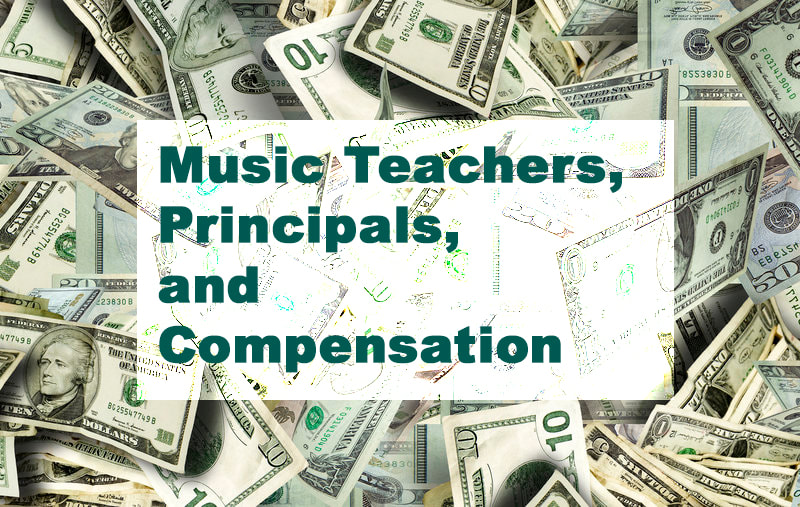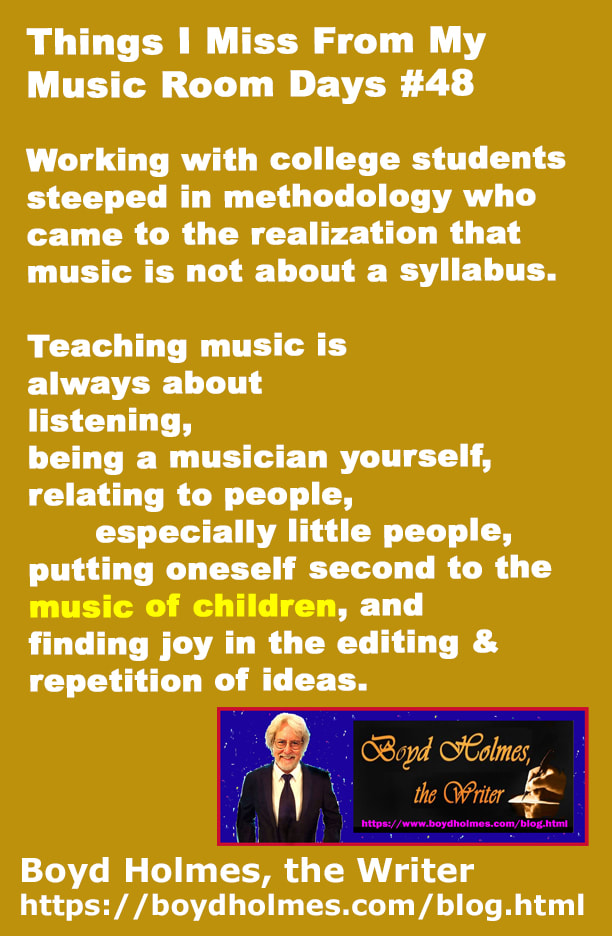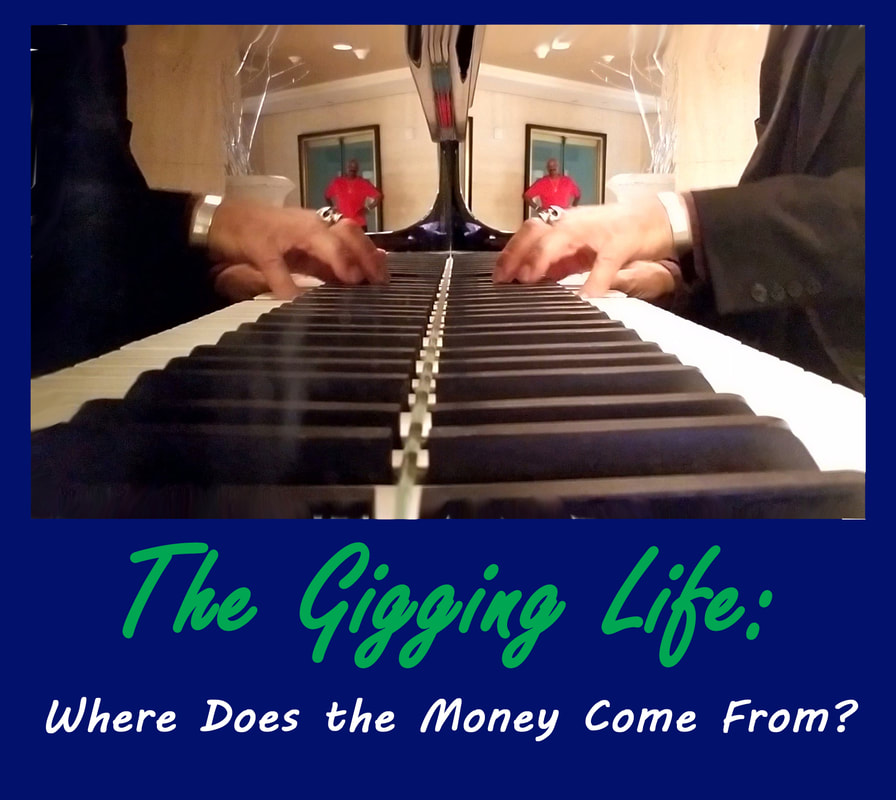|
Yes, as a music teacher, you know going in that you are going to net earn less than an administrator . . . . .
. . . . maybe. Let’s explore. Suppose you are feeling that being a classroom music teacher just wasn’t a good plan for you and that you might want to consider admin. Do you really want to trade being someone’s music teacher for being someone’s principal? Can you see yourself happily doing that job? That said, I know many former teachers who were never as happy as they were as a member of the administration team. If you want to parley your music education position into an admin gig, it's best to do it early in your career. Why? Because the financial rewards you gain with a higher salary will have the opportunity to compound over a longer period of time during your life. The downside of an admin position is, if you are young and starting a family, the job will create a substantial drain on one of your primary assets, namely time. The other reality that needs to be considered is that while you working in a 7.5 hour job, your principal is basically working a 24-hour job with no real time for developing a business. They are on call night and day. You’ve heard of “death by a thousand cuts”? Try “death by a thousand phone calls and emails”. They don't get the options that you do to check out at 3:30. It's as if they have an ankle bracelet on and it's dialed into the school. For wearing that ankle bracelet, they are mightily rewarded but it’s not like you can’t reward yourself in your 16.5 hour business. As a music teacher, you primarily report to a principal. As a principal, you report to everyone above AND below you on the school ladder – and every parent gets their own personalized rung. There is probably no school job description that has changed and ballooned in the past three decades as much as being a principal. Their endless admin responsibilities – especially during Covid – have pushed many principals to the point of leaving the profession. Has their compensation grown commensurately with their increased duties? I don’t think so. The phrase that comes to mind is “Is the juice worth the squeeze?” To their benefit, their “pay and stay” (IRAs and Roth IRAs) investments are sizable and begin compounding right away. In your 16.5 hour business, you report to no one but yourself. Not so for the principal. The bulk of a principal’s medical and health benefits are often the same as yours. They have no union protection nor the legal liability package that comes with NEA membership. They have a different vacation package then you have, and sick days don't really factor into their professional life. If they are out sick, it's typically on their assistant principal or student advisor to pick up the slack. When you're out, you need to leave lesson plans and report your pending sick day on the internet to the substitute service. I’ve seen teachers who groused about coveting their principal’s salary. They lose focus on all the extra responsibilities that come with their boss’s job. Admin are fielding “must answer” calls at ten in the evening and six in the morning while you are developing a deeper relationship with a bag of Cheetos and a Netflix series. You have much more latitude to develop your own down time as well as your business. It’s not what you make; it’s what you keep. Remember my “. . . maybe . . ." back at the top? Don't feel you have to be an administrator or a principle to make a lot of money in the education world. As long as you figure out your 16.5 hour business, you'll be fine but don't hesitate. Do what gives you satisfaction during in those 7.5 hours we refer to as “your job”. If you feel that admin gives you the feeling of “power”, there are many other ways to get that feeling by developing your own business. By focusing on your “business” career, you may be leveraging your autonomy for less front-loaded money but if that is what you are really looking for in your life, you should go for it. Frankly, anyone who pursues a career in education thinking it will fulfill a need for “power” has larger demons to resolve before working with kids or teachers. The gig is about “service”, not “domination” or “power”. “Compensation” comes in a variety of forms. Next to a paycheck and a state pension, the one I valued the most was time – a 7.5 hour job gave me latitude to do a multitude of opportunities to explore different musical interests which often led to a larger revenue stream. Teaching music to kids and developing young proactive leadership qualities in my students was working for me. No admin gig could replicate that sensation for me. Whatever you decide to do, take action today! Start with some research. Talk to friends. Identify the ruts you might be in and recast them as an early chapter in your impending best-selling “success story”. Create a one, five, and ten year scenario that mirrors you and your families values, goals, and wants and start on that plan. And as far as comparing what you and your principal get paid, remember that even if the grass seems greener on the other side, you still have to mow it. Third year music education majors participate in practicum.
Part of this course involves observing a variety of different music educators in the field. Over the years, I was fortunate to have some incredible University of Delaware and West Chester State practicum students observe me teach in a variety of educational settings. With each batch of students, I got my fair share of “You’re amazing!”, “How are you able to get so much done?”, “Is there a trick to it?” and my favorite, “You make it look easy!” While I don’t work with practicum students anymore, should you be reading this and are a bit of a “newbie”, let me elucidate a few basics. If a music teacher you observe in the field “makes it look easy”, realize that whatever they are doing, you are not watching them do it for the first time. Or their second or third time. Nor did they excel in an undergrad class entitled “Make It Look Easy 401”. And as far as “tricks” go, what these effective teachers are doing is only a trick in as much as it behooves a magician to put the rabbit in the hat before the audience shows up if they intend to pull it out during the show. Here’s the deal. After a music teacher has confidently faced classes thousands of times, scripted and edited their presentation on hundreds of legal pads, prepared for every possible student/principal action and reaction, and learned how to be professional, musical, funny, unflappable, and, yes, comfortable in their own skin, “making it look easy” is something that rarely, if ever, enters their mind while teaching – but it is always front of mind for observers. Conversly, when you watch an indecisive, struggling teacher who has a lot of years under their belt, you probably ARE seeing them do something for the first time. For whatever reason, they haven’t ascribed to the idea doing the same techniques over and over with serious analysis and modifying. They are continually trying things for the first time with little connection to anything they’ve tried in the past. They’re looking for that “golden” trick that doesn’t exist. Sort of like “Groundhog’s Day” with instruments. For them, every day is a new opportunity to furtively try something new and go down in flames. Curiously, these struggling teachers are often the first to repeatedly tell you how “professional” they are or trot out their references. They have to resort to this strategy because you are sure as hell not going to see any expertise while they are teaching. It’s a variation of Richard Pryor's line: “Who you gonna believe – my CV or your lyin’ eyes?” “Making it look easy” is a symptom of a teacher who constantly recoils from trying to re-invent the wheel. They choose instead to build a larger wheel and let it roll forward under its own impetus and weight. These teachers never take professional momentum for granted. They are always exploring ways to build on their successes. Find what works with your students and make sure it’s in alignment with your goals - and in the words of Little Feet, "Let it Roll"! So maybe you're saying "Yo, Holmes! How about that young, fresh teacher who makes it look easy? How is it that they make it look so easy so early in their teaching careers?" You can “make it look easy” early in your career if you commit yourself at the outset to self-critique and what can sometimes feel like brutal honesty. The sooner you embrace editing of class presentations, the better off you’ll be. The other thing these terrific tyro teachers sometimes have going for them is that they have, in a short period of teaching gestation, worked in a wider variety of settings with a broader population spectrum than the average teacher. In short, they have seen more in a shorter period of time. They don’t hyper-define themselves as “an elementary general music teacher who does vocal and chorus” or a “middle school instrumental teacher who does concert and marching band”. They see themselves as a musician first, a teacher second – and possess a willingness to embrace any new assignment because they know that in both the short and long run, it will make them a stronger teacher. The more you observe and teach in a variety of settings early in your career, you will create teaching capital that you can invest and compound with every following teaching gig - and the sooner you’ll be one of those teachers “making it look easy”. Hint: take every music teaching gig you can. You’ll realize that those teachers have a few things in common. While “making it look easy” might have once been a component of their lesson plans stacks of yellow legal pads ago, for all of them it has now morphed into a mindset for them. Before you ever observe one of these accomplished teachers, they’ve studied their scripts and dress rehearsed their lessons so many times that “making it look easy” is now part of who they are. It’s in their DNA. By the way, once you master the “make it look easy" look, you are just as adept at the “making it look hard” show, too. “Making it look hard” can be utilized for effect – but know that it will be an act. When music teachers make it look hard and pull it off, they usually only do it to make a point, like because of a specific student (or principal) needs to observe an amplified level of professional grit, tenacity, or effort. But “making it look hard” is always temporary: they always subconsciously revert to relaxed nonchalance. Why? It’s who they are. The real reason that “making it look easy” never enters the head of an accomplished music teacher while they’re teaching is because when they’re teaching, they’re having too much fun. For more advanced writers: Write a simple song and then turn it into a more complex song. Then do the opposite. Write a complex, dense song and simplify it. It’s a technique I’ve used with great results. No one has to know the original version of your song – just you. What counts is what remains after your editing and re-writing. Which brings me to “Dirty Loops”. If you aren’t familiar with the trio “Dirty Loops”, check them out. When they first broke out, they caught the attention of millions with their covers of Justin’s “Baby, Baby” and Britney’s “Circus”. They took these simple pop songs and re-arranged them into incredible jazz/pop/fusion pieces that were amazingly intricate and opaque.
When they started sharing more of their own originals, they shared a songwriting technique. They didn’t start by trying to write something that sounded like a complex “Dirty Loops” cover; they composed a simple pop song and then covered themselves in the style of Dirty Loops. They covered themselves – whaat a concept! They first wrote simple, triadic pop songs that they then re-arranged and injected the “Dirty Loops” DNA in every note, chord, and rhythm. You’d be hard pressed to find the germ motif in their finished products – but it was a necessary part of their writing process. So why not give it a shot. Write something – and then cover yourself. With the tight schedule I was given, I had precious little time to set up for our chorus in the MPR.
I could never have done it without these kids helping me get all our equipment ready for rehearsal. Most typical American wage earners have a good grip on where their money comes from: work, resulting in a pay check.
Where things get murky is what happens to the money after they get it, primarily because many people go through life without creating or living by a budget. They just make payments and buy stuff. And that’s OK if you don’t mind not knowing at all times where your financial ship is on the Ocean of Life. When I was little, every week after I had done all my chores, my father reached into his pocket and gave me a quarter. I didn't start thinking about where that quarter came from for a few years . . . . Musicians are notorious for lax financial habits. We’ve all seen the memes. There is one specific work force that knows were every penny goes is going. Restaurant and bar owners. Their profit margins are slim and anything less than assiduous financial habits can drive their investment into the ground. When you are a gigging musician, you are working for an investor before you are working for a club owner. Everything they spend money on either means more money going out of their pocket or more money staying in their pocket. What they spend on toilet paper, cleaning supplies, potatoes, cocktail napkins, and yes, salaries are always and justifiably under their scrutiny. While many musicians bitch about playing gigs in the 2020s at 1970s wages, they rarely take the club owner’s perspective. That $150 they get at the end of the night comes from somewhere other than a fairy godmother’s satchel like in Cinderella. It comes out of the club owner’s pocket. And aside from the obvious point that you are working to keep the club owner happy, it behooves the gigging musician to embrace the basic idea of where his paycheck originates. It comes from the profits of the club owner. If he doesn’t have an act to pay, that means he has more money to keep in his pocket. As musicians, we have to give them constant reassurance that their investment in us is truly a profitable investment and not ill-conceived charity. One place where club owners get to make a profit and mark up their prices is with alcohol, especially beer. Let’s construct several scenarios focused on beer and hiring an act for $150. Ok. The club owner pays an act $150 for three hours on a Friday night. Where does that $150 come from? FYI, the average markup on beer is 75%. Scenario 1: So, for the sake of discussion, there is no act and a beer is $6. The bar sells 100 beers at $6 per beer . . . $600, right? The cost of the beer, 25% of that $600, is $150. That $150 is out the door. The bar ostensibly pockets $450 (75%) to cover overhead. Scenario 2: There is an act and a beer is $6. The bar sells 100 beers at $6 per beer . . . $600, right? 25% of that $600 is $150. Again, $150 is out the door as the cost of the beer. The bar ostensibly pockets $450 (75%) to cover overhead. So the club pays the act $150 and the beer distributor $150. That leaves the club with $300 . . . 50% profit on beer to pay their overhead. That’s a 25% drop in their profit. Would you be smiling if you lost 25% of your profits? Scenario 3: How about if the bar sells 200 beers and hires an act! 200 beers @$6 a beer = $1200. Cost of the beer = $300 Cost of the act = $150 Profit on beer = $750 (62.5% profit) Scenario 4: How about if the bar sells 400 beers and hires an act? 400 beers @$6 a beer = $2400. Cost of the beer = $600 Cost of the act = $150 Profit on beer $1650 (68.75% profit) Notice how the club owner’s profit on beer is never as high as it was when he/she wasn’t hiring a musical act. Restaurant owners are continuously prioritizing – what to buy, what to pay, what to put on the menu, what to take off. They almost always know their “number” - that is, when they are in the red and when they move into the black. Their number one priority is to stay both afloat and open. Before an act plays a single note, every club has to pay a yearly fee of approx. $1000 to ASCAP for the right to play background music in their club. And since Covid, every club is struggling just to find staff to work in their kitchen and serve food. Back to the beer. In our models, if people drink 3 beers, in order to do the math, Scenario 1 needs 34 customers, Scenario2 requires 67 customers, and Scenario 3 requires 134 customers. Their business gross/profit margins are very slim. They have already paid for ASCAP/BMI house music, a PA system, and/or a digital jukebox lease. There has to be a steady stream of traffic in and out of the club. And it helps if the club is larger than average. You, Mr./Ms. Musician, are there to create more traffic into the establishment. No matter how large the venue is, if the act does not draw people and then keep people in seats longer, which in turns translates into a few more alcohol sales, which turns into more profit margins, which keeps more of the owner’s money in their pocket, it makes no sense for a club to have live music. When you understand this paradigm, things fall into place on gigs and you achieve what we call “flow”. Several months ago, I did a last minute three-hour gig at a restaurant in Old New Castle. When I loaded in, there were about a dozen people in the place. I immediately started asking for requests and played all of them. As more people came in, I edged the volume up to raise the conversation volume level and drop inhibitions a bit. Pro tip: people drink (read: spend and tip), socialize, and laugh more when given a reason to talk louder than they do in their normal setting. I was getting multiple requests for songs as I was playing the previous request. People started facetiming me with their friends, telling them that they need to get to the bar because “this guy is playing everything” and “everyone was there and party was starting”. The bar was exceptionally busy. I didn’t take any breaks – just played continuously. The tips were as steady as the stream of requests. The flow resembled the sustained rush of the Monongahela River. And the requests were mirroring the increasing energy in the room. At the beginning of the third hour, the place was packed and a full-fledged party had broken out. The owner of the club came running up to me. “We’re swamped! You’ve got to play some slow stuff to get some of these people out of here.”, which I did. Mission: accomplished. When we play a bar gig, we need to be armed with knowledge. We are not there to play our five most soul-searching originals or deep cuts by obscure artists. We are there to help the owner achieve their business goals as well as entertain the customers as intensely, relentlessly, and memorably as possible. Anything else is rock and roll fantasy and not business. |
AuthorBoyd Holmes, the Writer Archives
June 2025
Categories |










 RSS Feed
RSS Feed